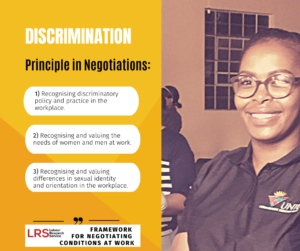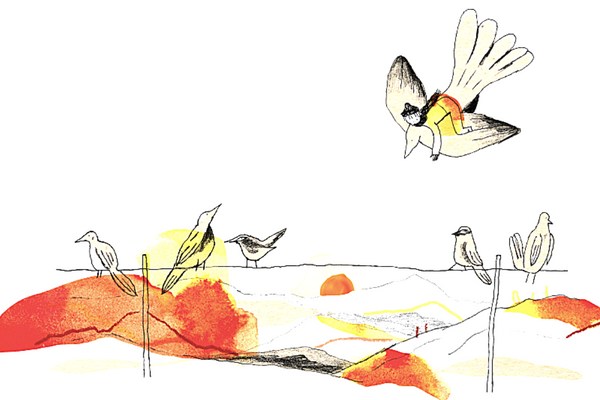A conversation with Nosipho Twala, Gender Equality Educator and Facilitator at Labour Research Service.
Why is Convention 190 groundbreaking?
ILO Convention 190 (C190) is the first international law to establish the right of everyone to a world of work free from discrimination and violence, including gender-based violence and harassment. C190 is supplemented by Recommendation 206 (R206), which shows how to implement the convention at the national level.
Conventions and recommendations are made by representatives of workers, governments and employers and adopted by ILO’s International Labour Conference. Countries then ratify the conventions and commit to having supportive national legislation and policy.
South Africa ratified C190 in November 2021. The Code of Good Practice on the Prevention and Elimination of Harassment in the World of Work came into effect in March 2022. The code, which forms part of the Employment Equity Act, attempts to cover the gaps in legislation.
C190: Key features
- To eliminate all forms of violence and harassment in the world of work.
- To protect all workers in all sectors.
- To address domestic violence (C190 shows how domestic violence follows workers to the workplace)
- To cover the gaps in national legislation
C190: Key definitions
Violence and harassment: Behaviours and practices that are unacceptable and that can lead to physical, psychological, sexual or economic harm. This can be one incident or a series of incidents.
World of work: Any process linked to bringing people together in relation to work – from the process of looking for work to the process of having your employment terminated.
What does the convention offer workers’ organisations?
C190 offers the labour movement an opportunity to strengthen our work on ending violence, harassment and discrimination in the world of work. Trade unions have power, agency and the tools to confront violence. We also need the political will to act now. C190 recognises the need to promote equality and inclusion to have safe workplaces. It links domestic violence and violence in the world of work. The convention highlights the impact on women workers and other marginalised groups, such as the LGBTIQ+ community, who have a disproportionate experience of violence in every context. Employees who experience violence have low productivity and wellness. Workers are first members of communities, and workplaces essentially mirror our communities and society. The worker is a key agent in promoting C190 in the community and should be equipped to engage with the convention.
What actions have unions taken against GBV and to popularise C190?
The Labour Research Service supports various initiatives for ending violence and gender-based violence (GBV) in the world of work.
SACTWU – the textile union – is involved in participatory action research in a broader project for supporting women and other marginalised workers and their unions to prevent and address GBV and harassment in the global clothing, garment and manufacturing sector and supply chain. We will have a better understanding of how violence manifests in female-dominated sectors.
SADTU and NAPTOSA – the teachers’ unions – have commitments to ending violence and GBV in school communities. SADTU has a collective agreement that speaks to violence and GBV. Together with other teacher unions in Africa, SADTU and NAPTOSA have developed strategies for ending GBVH in educational settings that offer an example of how a public sector union can build an effective GBV strategy.
HOSPERSA is taking the C190 forward through its social action initiative for reducing GBV in a health institution in Gauteng Province. In a society that does not value the work of caring, the health sector union experimented with individual and collective actions for reducing violence and changing perceptions about the value of care work and healthcare workers.
SACCAWU – the retail union – has a long-standing commitment to addressing gender-based violence and harassment and has integrated it throughout the union’s training and education programmes. Through the women’s committees for addressing violence and harassment, the union raises awareness and provides information materials to emphasise the problem of GBV and to tell workers how they can get help.
We applaud the gender coordinators at COSATU and FEDUSA for their dedication to campaigning for the adoption, ratification and implementation of C190. The federations have inclusive gender programmes and well-equipped gender coordinators and negotiators capable of advancing safety and LGBTIQ+ rights in collective agreements and union policies. FEDUSA’s LGBTI resolution recognises the forms of discrimination throughout the employment cycle and the Gender Equality resolution has a focus on C190 and reaffirms that:
“Violence and harassment are incompatible with any notion of decent work. It affects people’s ability to obtain work and stay at work, as well as their physical and mental well-being. It affects workplace culture, dignity at work and productivity. It is therefore a key issue for trade unions to organise around.”
How can we get C190 on the collective bargaining agenda?
We need to balance the wage and non-wage demands. This demand speaks to safety in the workplace and is easy to get on the bargaining agenda and win. Workers spend a lot of time in the workplace. If they feel safe, they are productive and happy. C190 also places responsibility on the employer to ensure a safe workplace. The convention compels employers and managers to treat workers with respect.

The anger chain: Boss shouts at a man. The man gets home and shouts at the wife because he has power over her. The wife shouts at the child because she has power over her. The child shouts at the pet. The ‘power over’ trickles down and becomes toxic. C190 helps us to use our power responsibly.
What is the principle behind a condition at work? Conditions at work always have a principle of wellbeing, fairness or a social value that underpins them. This principle forms the foundation of arguments in negotiations. Source: A framework for Negotiating Conditions at Work, LRS Negotiators’ Guide (2022)

What is the biggest challenge to ending GBV?
The law is okay, but we are struggling in the area of changing social norms. We need to unlearn many things. Toxic masculinity, for example, is one of the drivers of GBV, and men are also victims of patriarchy. Men are taught to be strong and not cry or express their emotions. We need to be deliberate and honest about norms because women and children are increasingly on the receiving end. In a country with incredibly high levels of GBV, it is time to walk the talk and use the raft of tools and initiatives at our disposal. Unions have a role in shaping norms. They have influence and negotiate with the government at many levels. Unions must use their agency to respond to structural violence.
What actions can we take during the 16 days of activism against GBV?
The 16 days of activism comes against the backdrop of increasing mental health and GBV incidences. Workers are traumatised by the impacts of the Covid-19 pandemic on the economy and social fabric. The nature of some of the jobs we do often manifests violence. We have internalised oppression. These are some of the areas to focus on.
As workers and leaders, we must practice self-care and other popular approaches and methodologies for nurturing our humanity to use power responsibly. If you practice self-care, you can care for others better, engage with respect and foster environments that support creativity and innovation.
As part of a vibrant civil society that promotes egalitarianism, unions have stood in solidarity to push for important issues. Let’s use our agency and strong tools and alliances to advance safety in the workplace and communities.
__________________________
Leballo Tjemolane, Doctoral candidate, Women & Gender Studies, University of the Western Cape and panelist at a recent DITSELA webinar:
They say stories are data with a soul. It is within stories that we understand what life is about. When dealing with gender issues, it is not one dimensional but like an onion which we need to peel and reveal layers. And as you peel, tears fall because our vulnerability and trauma surfaces. I see how toxic masculinity gets fuelled. As a black man exploring gender issues, I have been forced to unlearn many things. But the more I enquire and interrogate notions, I am reminded I am outside of these things but I also am part of it. It is like I am protesting against the system while I am part of the system. How do I use the master’s tools to break down the laws in all areas where social transformation is concerned?
RELATED ARTICLES:
- Practical guide for implementing ILO Convention 190 in public sector workplaces
- Taking Action on Violence and Harassment against LGBTQI+ Workers (Facilitator Guide)
- Taking Action on Violence and Harassment against LGBTQI+ Workers (Participant Handbook)
- Workplace rights belong to everyone: Negotiating for inclusivity and against discrimination
- Strategies to end school-related gender-based violence: The experience of education unions in Africa







